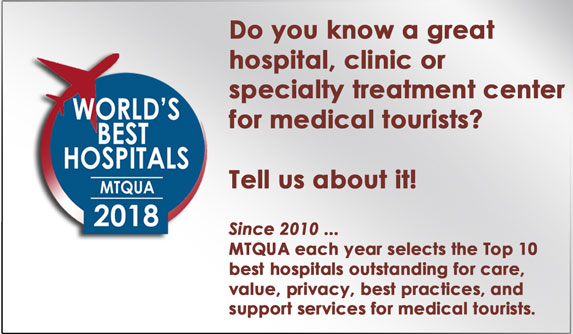For a happy, high quality, stress-free medical vacation with a great outcome, take note of the following suggestions.
1. DO go where you know you’ll get excellent medical treatment.
Many medical tourism companies promote countries or hospitals they have very little information about. When choosing a medical tourism company or agent, make sure the hospitals these companies are promoting actually work with the company or agent. You can ask the hospital for a list of the medical tourism companies they accept.
When major countries promote themselves as “medical tourism” destinations, they may be promoting only a few of the hospitals with the highest medical standards or they may be promoting the country as a whole without heed to the quality differences they are imposing on unwitting medical tourists. It’s good to know which it is.
2. DO plan ahead, especially if you’ll be traveling at peak tourist times.
You’ll be competing for treatment with other medical travelers and health tourists, and for hotel space with regular tourists. The most popular times medical tourists choose to go abroad for treatment often coincide with peak tourist times. Excellent surgeons don’t grow on trees.
3. DON’T rely mainly on the Internet for your research.
The best surgeons don’t need to solicit business. Hospital web sites are advertising tools that often contain outdated or incomplete information, especially about staff and costs.Chat rooms, testimonials, patient ratings are additional sources of information found on the Internet.
Use websites such as this as an alternative for information about finding quality care for international patients. MTQUA publishes an annual list of the Top 10 World’s Best Hospitals for Medical Tourists™.
4. DO ask about a surgeon’s fellowships or specialized training.
Does he or she regularly attend international professional meetings? How recently has she practiced or trained in the U.S. or Canada? Or in Europe? How many years of experience does he have in the specialty? Medical tourism companies should have this information. If you’re working with a certified medical travel concierge, he or she will most certainly have this.
5. DO invest a few dollars in a telephone call.
Your conversation with the surgeon’s representative or with your medical travel care manager will be a good indicator of the attention you’ll get later. All good medical tourism companies will be happy to arrange this for you.
6. DON’T be stingy with your vacation time.
Take advantage of the medical attention that’s available to you during recovery so that your return home is uneventful. Better to spend an extra day or two in recovery than to start traveling too soon. Your surgeon or medical travel advisor will be happy to guide you on this.
7. DON’T cut costs by going with the “lowest bidder.”
Keeping down the cost of surgery or staying at a budget hotel may sound like a good idea at first, but experience shows you may be sorry later.
This is especially so with plastic surgery. Plastic surgeons are reluctant to revise another surgeon’s results so if you make a mistake, you may live with it for a long time. The better solution is to use an experienced medical travel company and a top surgeon.
8. DO get everything (or as much as you can) in writing.
Before you go, know your costs, procedures, dates and times of the consultation and surgery, number of nights in the hospital and contact names and telephone numbers your family can use to reach you.
9. DON’T feel you’re “stuck” with the doctor you first chose when you were at home.
When you finally meet your surgeon, don’t be seduced by the Botoxed doctor with the smooth bedside manner, or intimidated by the one who wants to ratchet up the procedures and costs.
If you have second thoughts, don’t be afraid to ask your medical travel company or medical travel concierge for another doctor in the same hospital or a different hospital. It’s your right as a patient to get a second opinion or a second doctor you trust. MTQUA provides a list of medical tourist rights.
10. DON’T take stupid chances.
There is always some doctor somewhere who will agree to anything you want. This may be the only time you will travel for medical treatment. Do it right. Medical tourists often have time and work constraints, and want to get things done as quickly as possible.Medical tourism companies rely on the individual medical traveler to take responsibility for aspects of the medical journey.
BONUS TIP
No matter what we say here, we KNOW you won’t pay attention. You WILL feel stuck with a doctor you don’t care for. You WILL take stupid chances – you don’t think you are, but…. You will get the surgeon’s credentials and you will accept them without understanding them.
Many times, we have received phone calls from non-clients asking for help. Unfortunately, by the time you call us, the damage has been done, the money has been spent, and we have very little we can do to help.
11. Above all, DO use a trained medical travel planner from a reputable medical tourism company.
Most medical tourism companies have personnel to guide you in making your choices. A good, experienced medical travel advisor has a direct pipeline into the best doctors and hospitals. In the long run, you will save money, get the best treatment, have a stress-free recovery and return home truly relaxed.

 >
>